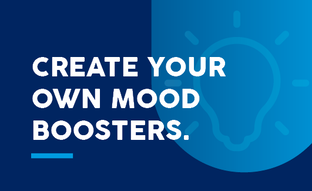|
The wintery weather has well and truly set in, and some of us will be experiencing excitement — the snow boards and skis are getting their annual dust-off ready to hit the slopes — whereas for others the gloomy days could be inciting gloomy thoughts. And of course the weather is just one of myriad things that can be influencing our mood and affecting our outlook at any given time. In the workplace, some signs are easy to spot in those who are experiencing a downturn in their mood. They could be more irritable than usual, less communicative, more easily frustrated by tasks, repeatedly arriving late for work, or absent more often. It’s important that we each be able to recognise where our own mood levels are at. At the end of each day you can check in with yourself and reflect – ‘what did I do today that gave me a sense of achievement, pleasure, or closeness with others? What can I do more of or differently tomorrow?’ And sometimes it's not us but a friend or loved one who's experiencing low mood. Doing something for a workmate, friend or family member can help improve our own mood, add to our life satisfaction, provide a sense of meaning, increase our feelings of competence and decrease our stress levels. If you're concerned your friend or loved one's low moods could be a sign of a bigger health issue, make time to ask how they are and really listen to what they have to say. Remember, too, that mood is contagious. If you work in a close environment with others, how you respond to your own mood may also have an impact on their day. But while changes in mood are inevitable, when the doldrums hit there are ways we can lift our spirits. AIM FOR BALANCE An imbalance of pleasure, achievement, and feeling connected to others can affect our mood. For example, if you spend most of your time working with no time for pleasure or socialising, then you may start to feel low and isolated. Conversely, if you spend most of your time relaxing for pleasure and not doing other things that are important to you then this can also impact your mood. It’s important to have ways to lift your mood in a short period time, and to balance that with the anticipation of looking forward to an event or activity in the future. Carry out the following exercise by yourself or with others. Exercise 1. Take ten minutes and write a list of the things you love to do; that give you pleasure and/or a sense of satisfaction. Write as many as you can think of – aim for at least 20 lines. 2. Next, go through your list and made a note beside each as follows: N – things you can do now, straight away L – things you can plan for and look forward to doing at a later time F – those that are free or inexpensive S – those that you have to save for Q – things that you can do quickly that take 15 minutes or less H – things you can enjoy for hours C – things within your comfort zone Ch – things that challenge you and take you outside your comfort zone 3. Review your results. What you are looking for here is balance. For example, do your answers show a balance between things you can do straight away and those that you can look forward with pleasure to doing at a later time? Apply this lens to each of the four areas and if you see a lack of balance, consider what you can do to redress the balance. SOME QUICK TIPS FOR LIFTING YOUR MOOD Raising your mood doesn’t necessarily need to be hard work. Know yourself and what makes you feel good, then include more of that in your day.
These sorts of things can substantially boost your mood and energy for long enough to put a second step into action; such as catching up with a good friend or taking a trip. For a more comprehensive set of ideas, check out the attached tip sheet. We have also included a blank sheet where you can fill out what you like to do that makes you feel good, and that you can easily refer back to when you start to feel a bit low. Try to include some things you can do every day that will help build your resilience so you will be less prone to a downturn in your mood. 'We can't direct the wind, but we can adjust the sails’. Thomas S. Monson |
© COPYRIGHT 2015. ALL RIGHTS RESERVED.



